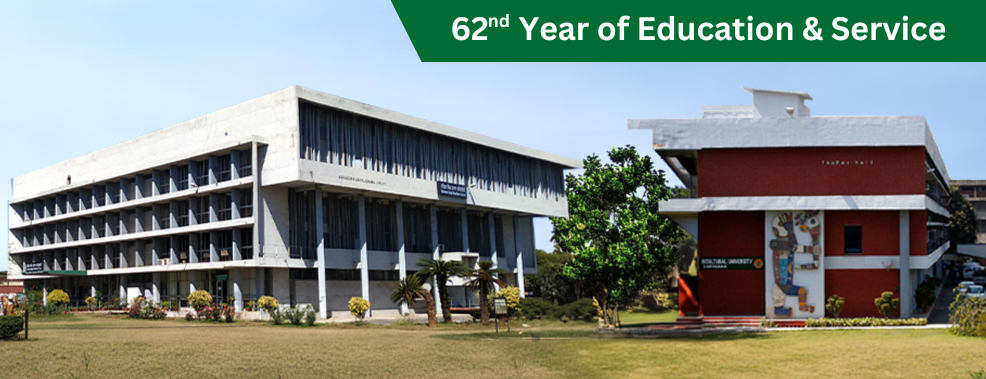62nd Year of Education & Service
College of Agricultural Engineering & Technology / Soil & Water Engineering / Faculty
Name : |
Dr Chetan Singla |
Designation : |
Scientist |
Office Phone : |
-- |
Mobile : |
9872034222 |
Email (Office) : |
chetan_singla@pau.edu |
Research Areas : |
-- |
Researcher ID's : |
-- |

College of Agricultural Engineering & Technology / Soil & Water Engineering / Home
The Department Soil & Water Engineering was established in the year 1974 when the erstwhile department of Agriculture Engineering was trifurcated. Dr. S.D. Khepar was the founder head of the department. The department has rendered yeomans services to the farming community by way of developing technologies relating to irrigation and water management, ground water and tubewells. The studies on the use of drip irrigation for some selected vegetables and crops, polyhouses for raising nurseries and high value vegetable crops, on farm irrigation water management, sprinkler and drip irrigation, technologies for Kandi areas, groundwater simulation for sustainable agriculture, management of water resources through artificial groundwater recharge, evaluation and improvement of operational efficiency of pumping sets and development of efficient tubewell components, evolving suitable management strategies for drainage of water logged soils and polluted water because of excessive use of agro-chemicals for improving agriculture production, are the core research areas of the department. A high discharge propeller pump to lift water under low head conditions has been developed for use in the undulating areas of South-West Punjab where canal water need to be lifted by about 1.0 meter for irrigation of the higher elevation fields. Pump testing lab has been developed. Evaluation of performance of submersible pumps on limited scale at field level has also been conducted. To address the problem of declining groundwater table in the region studies on artificial groundwater recharge through tubewells, roof top rainwater harvesting and recharge through drainage network has also been undertaken.
College of Agricultural Engineering & Technology / Soil & Water Engineering / Head of Department

Name : Dr. J. P. Singh
Address : Department of Soil and Water Engineering
Phone : 9872883963
E-Mail : hodswe@pau.edu
Brief Introduction
Dr. J. P. Singh has 28 years of teaching, research, and extension experience in the field of Soil and Water Engineering and 5 years: 6 months of administrative experience as a Hostel Warden. He took over as Head (Additional Charge), Department of Soil & Water Engineering, College of Agricultural Engineering, Punjab Agricultural University (PAU), Ludhiana from November 1, 2021, to January 16, 2023, and December 27, 2023 (about one year 4 months). He did B Tech (Agril Engg) from Allahabad Agricultural Institute (AAI), Allahabad, UP, M Tech (Soil & Water Engg) & Ph D (Soil & Water Engg) from the Department of Soil & Water Engineering, College of Agricultural Engineering& Technology, PAU, Ludhiana. He was bestowed with prestigious Jawahar Lal Nehru Award for the best PhD thesis by Indian Council of Agricultural Research (ICAR), New Delhi, Young Scientist Award & Kunwar Saxena Bahadur Award by the Society of Recent Development in Agriculture, Fellowship Award by the Hi-Tech Horticultural Society, Agricultural Engineering Division Medal for best research paper by the Institution of Engineers, best Research Paper Award & Oral Research Paper Presentation Award by the Indian Society of Agricultural Engineers (ISAE) & Research Foundation and Senior Research Fellowship (SRF) for pursuing Ph D by the Council of Scientific and Industrial Research (CSIR), New Delhi. He taught about 8 UG & 8 PG courses, developed a few PG courses & Remote Sensing & GIS lab too, and guided 3 Ph D students & 13 M Tech students as major advisor. He was instrumental in starting a new PG (M Tech) program in Remote Sensing & GIS in the department. Currently, handling FIST, DST funded project of Rs. 1.52Cr for the Establishment of a State of Art Geospatial Lab as PI and North India Center for Water Technology Research in Agriculture as CoPI and involved in several competitive & AICRP projects as PI & CoPI. He was a Technical Advisor to the Drainage Division of the Punjab Govt for the design and installation of a subsurface drainage system in south-western districts of Punjab under a drainage project funded by the World Bank. He has published about 70 research papers in National & International journals repute and presented more than 30 research papers in National/International seminars/conferences/symposia. One of the developed technologies “Filter for Canal Water Potability” is under patent. He has been a member/chairman of various committees at the State & National level on waterlogging & drainage and professional society.
College of Agricultural Engineering & Technology / Soil & Water Engineering / Thrust Areas
- Modelling studies for groundwater management and its augmentation.
- Protected cultivation of high-value crops (Soilless media/Hydroponics/Aeroponics, etc.).
- Water saving technologies using IoT, artificial intelligence and machine learning techniques.
- Technology development and dissemination in surface and sub surface drip irrigation.
- Drainage technologies for water logged area.
- Soil and Water Conservation technology for Kandi area.
College of Agricultural Engineering & Technology / Soil & Water Engineering / Faculty
Faculty
| S.No | Name & Designation | E-Mail/Telephone |
| 1. | Dr Amina Raheja Scientist |
amina19@pau.edu +91 81469-33666 |
| 2. | Dr Angrej Singh Senior Agronomist |
angrejsingh30@yahoo.com, angrejsingh30@pau.edu +91-81463-88111 |
| 3. | Dr Arun Kaushal Professor |
arunkaushalarun@rediffmail.com, arunkaushal@pau.edu +91-98553-38437 |
| 4. | Dr Chetan Singla Scientist |
chetan_singla@pau.edu 9872034222 |
| 5. | Dr Dnyaneshwar Arjun Madane Assistant Professor |
madane@pau.edu 9552055636 |
| 6. | Dr J. P. Singh Professor |
jpsingh@pau.edu +91-98728-83963 |
| 7. | Dr Jugraj Singh Sr. Scientist |
jugrajsingh@pau.edu 9815547607 |
| 8. | Dr Mahesh Chand Singh Scientist |
msrawat@pau.edu 9780455156 |
| 9. | Dr Mukesh Siag Associate Professor |
siagmukesh@rediffmail.com, siagmukesh@pau.edu +91-98729-99640 |
| 10. | Dr Nilesh Biwalkar Professor |
nileshbiwalkar@gmail.com, nileshbiwalkar-swe@pau.edu +91-8146977883 |
| 11. | Dr Rajan Aggarwal Principal Scientist |
rajanaggarwal1@rediffmail.com, rajanaggarwal1@pau.edu +91 98722-08744 |
| 12. | Dr Rakesh Sharda Principal Scientist (Plasticulture) |
rakesharda@yahoo.com, rakeshsharda@pau.edu +91-98555-45189 |
| 13. | Dr Samanpreet Kaur Associate Professor |
samanpreet@pau.edu +91-9501114235 |
| 14. | Dr Sanjay Tukaram Satpute Scientist |
sanjay4471@gmail.com, sanjay4471@pau.edu +91-94780-69067 |
| 15. | Dr Sudhir Thaman Scientist |
sudhirthaman@pau.edu 94658 97562 |
| 16. | Dr Sunil Garg Principal Scientist |
sunil1765@rediffmail.com, sunil1765@pau.edu +91-94633-19365 |
College of Agricultural Engineering & Technology / Soil & Water Engineering / Faculty Distinctions
| Sr. No. | Name | Year |
| ICAR National Professor | ||
| 1. | Dr S D Khepar | 1997-2002 |
| Jawaharlal Nehru Award | ||
| 1. | Dr S D Khepar | 1979 |
| Dr. S. K. Shakya | 1985 | |
| Dr. V. N. Sharda | 1991 | |
| 2. | Dr S N Panda | 1993 |
| 3. | Dr. J. P. Singh | 1998 |
| 4. | Dr. Anil Bhardwaj | 2008 |
| 5. | Dr. Samanpreet Kaur | 2014 |
| Rafi Ahmed Kidwai Award | ||
| 1. | Dr. A. M. Michael | 1967-1968 |
| 2. | Dr. S.D. Khepar | 1986-1987 |
| 3. | Dr. S. K. Shakya | 1996-1998 |
| 4. | Dr. S. R. Singh | 2000-2001 |
| NRDC Award | ||
| 1. | Dr M P Kaushal | 1976 |
| 2. | Dr S D Khepar | 1976 |
| Fellow | ||
| 1. | Dr S D Khepar | NAAS |
| 2. | Dr S D Khepar | Institution of Engineers |
| 3. | Dr S D Khepar | ISAE |
| PAU Awards (Gold Medal) | ||
| 3. | Dr Mahesh Chand Singh | 2019-20 |
College of Agricultural Engineering & Technology / Soil & Water Engineering / Important Achievements
1. Technology for detection and removal of harmful gases in tube well pits: The problem of accumulation of harmful gases has been found in tube well pits after the onset of monsoon period. When a person goes into these pits for repair and maintenance of pump sets, he feels difficulty in respiration and become unconscious after few minutes and may die if he remains in pit for longer time. The analyses of air samples show the presence of more carbon dioxide, increase in nitrogen and decrease in oxygen contents. A simple technology for detection and removal of harmful gases in tube well pits was recommended which has been well adopted by the farmers and extension agencies of the state. . Just lower a lighted kerosene lamp inside the pit before entering the pit. If it blows out, it indicates the presence of harmful gases below that point. Several methods were suggested to remove these harmful gases. Because of this, many farmers have been saved from the harmful effects of accumulated gases in tube well pits. It was because of this recommendation that the Govt. of Punjab included this as a cause of paying compensation to the affected farmers.
2. Roof top water harvesting for groundwater recharge: Rooftop rainwater harvesting being simple, economical and eco-friendly can be used for artificial recharge of groundwater recharge at mass level in the State of Punjab. This will not only improve the quality of ground water but also check the declining of water table problem to some extent. Beside this it will improve the roads condition and mosquitoes problem. More than 100 rooftop rainwater harvesting structures have been installed in different parts of the State, in consultation with the department.
3. Multiple well point system: The multiple well point system was conceived, designed, installed and tested in the experimental area of Golewala watershed for tapping floating thin layer of good quality water without much turbulence in the lower saline water zone. It consists of number of well points arranged in a line and interconnected to each other through a horizontal pipe line (lateral) buried at about 70 – 100 cm below the ground level, pumped centrally. The laterals are brought to centrally located sump such that delivery points remains about 15 cm above the sump floor level and the sump floor level should be kept about 2 m below the expected water level in the sump. The moment water is lowered in the sump through pumping, the sub-surface water starts moving from well points into the sump under siphon action. The multiple well point systems were then found to be technically feasible and economically viable
4. Low cost net house: Design of low cost net house with an average life of structure 25 year has been approved by the State Farmer’s Commission, Chandigarh.
5. Design of modified green house: A modified greenhouse was designed by increasing side ventilation area and providing top ventilations (windows at the top). This helped in optimizing environmental parameters viz. Temperature, relative humidity, and solar radiation for favourable plant growth and the farmers will be able to use the poly house for crop production throughout the year.
6. Mulch Laying Machine: Tractor Driven Mulch laying machine can be used for making beds, laying of mulch and drip laterals with the help of tractor. Total operational cost of the machine is about Rs. 2129/- per hectare. There is saving of 31.78 % and 68.8 % in cost of operation over partially mechanized operation (Bed planter + Manual Mulch + Manual Drip Laying) and completely manual operation respectively. Plastic laying mulching machine saves 81.43 % and 95.20 % labour over partially mechanized operation and completely manual operation respectively.
7. Development of rooftop/terrace vegetable nutrition garden model for urban and peri-urban population using soil-less media.
Punjab Agricultural University has become the pioneer to develop rooftop/terrace vegetable nutrition garden model for urban and peri-urban population using soil-less media. The technology has been developed under All India Coordinated Research Project (AICRP) on Plasticulture Engineering and Technology, operating in the Department of Soil and Water Engineering.
Salient features:
- It requires only 12.6 sq m (net area = 4.2 m x 3.0 m) and gross area is of 20 sq m ( 5.5 m x 3.6 m )
- The vegetable produced will be sufficient for a family of 2-4 persons.
- With Staggered sowing/transplanting, the vegetables would be available round the year.
- The approximate cost of this model is around Rs. 35000/
Salient REC Recommendations:
The salient achievements under drip irrigation system which not only results in increase in yield but also saves 20 % fertilizers through fertigation are as follows:
1. Response of Potato to different levels of Irrigation and fertigation with drip irrigation: Drip irrigation results not only in increase in yield but also helps saves 39% water over conventional method of irrigation.
2. Response of Chilli under drip irrigation with different irrigation and fertigation levels: Drip irrigation results not only in increase in yield but also helps saves 47% water over conventional method of irrigation.
3. Response of Wheat under drip irrigation with different irrigation and fertigation levels: Drip irrigation results saving 39% water over conventional method of irrigation. 14.1% higher yield with drip irrigation system as compared with conventional irrigation system.
4. Response of Onion under drip irrigation with different irrigation and fertigation levels: Drip irrigation results in saving of 44 % water over conventional method of irrigation. 82.1% higher yield with drip irrigation system as compared with conventional irrigation system.
5. Response of Spring Maize under drip irrigation with different irrigation and fertigation levels: Drip irrigation results in saving of 40 % water over conventional method of irrigation.
6. Response of Pea under drip irrigation with different irrigation and fertigation levels: Drip irrigation results in saving of 50 % water over conventional method of irrigation.
7. Response of Brinjal under drip irrigation with different irrigation and fertigation levels: Drip irrigation results in saving of 44 % water over conventional method of irrigation.
8.Response of Sugarcane under drip irrigation with different irrigation and fertigation levels: Drip irrigation results in saving of 35% water over conventional method of irrigation.39 tons/hahigher yield with drip irrigation system as compared with conventional irrigation system.
College of Agricultural Engineering & Technology / Soil & Water Engineering / Current Projects
| Sr. No. | Title of the Project | PI and Associated Scientists |
| AICRP Sponsored Research Projects | ||
| 1. | All India Coordinated Research Project on Irrigation Water Management |
PI: Dr Rajan Aggarwal
Co-PI (s): Dr Sanjay Satpute |
| 2. | All India Coordinated Research Project on Plasticulture Engineering and Technology |
PI: Dr Rakesh Sharda
Co-PI (s): Dr Angrej Singh |
| NCPAH, Sponsored Research Projects | ||
| 1. | Establishment of Precision Farming Development Centre |
PI: Dr Nilesh Biwalkar
Co-PI (s): Dr Mukesh Siag |
| National Hydrological Projects (NHP) | ||
| 1 | Establishment of field stations for measuring ET and Soil Moisture |
PI: Dr Samanpreet Kaur
Co-PI (s): Dr Mahesh Chand Singh |
| State Sponsored Research Projects | ||
| 1 | Research on development of irrigation and drainage system |
PI: Dr Sunil Garg
Co-PI (s): Dr Mahesh Chand Singh, Dr Sudhir Thaman, Dr Amina Raheja |
| Competitive Research Projects | ||
| 1. | Pilot Implementation of Direct Benefit Transfer for Electricity (DBTE) to Agriculture” approved by World Bank through TERI |
PI: Dr Rajan Agarwal
Co-PI (s): Dr Nilesh Biwalkar, Dr Samanreet Kaur |
| 2. | Consortia Research Platforms on Precision Farming and Micro-irrigation Systems |
PI: Dr Rakesh Sharda
Co-PI: Dr Angrej Singh |
| 3. | FIST-DST for Establishment of State of Art Geospatial Lab |
PI: Dr J P Singh
Co-PI (s): Dr Samanpreet Kaur, Dr Mahesh Chand Singh and Dr Pravin Dahiphale |
| 4. | Use of supplemental carbon-dioxide for improved crop yields, quality production and control of insects-pests under controlled conditions |
PI: Dr Rakesh Sharda
Co-PI (s): Dr Mahesh Chand Singh |
| 5. | Efficient Input Management system with emphasis on Resource Conservation, sponsored by Punjab State Government | PI: Dr Rakesh Sharda |
College of Agricultural Engineering & Technology / Soil & Water Engineering / Important Publications
- Goyal P, Sharda R, Siag M and Biwalkar N (2023) Development of the crop coefficient for vertically trained cucumber vines grown in soilless media under naturally ventilated greenhouse conditions. Irrig Drain 72: 377-89.
https://doi.org/10.1002/ird.2793 - Sharma Y, Sidana B K, Kumar S, Kaur S, Sekhon M K, Mahal A K and Mehan S (2023) Pre and post water level behaviour in punjab: impact analysis with DiD approach. Sustainability, 15: 2426.
- Singla C, Aggarwal R, Kaur S and Sharma R (2023) Analysis of meteorological parameter changes using Mann-Kendall statistical tests in Indian Punjab. Mausam 74: 207-13.
- 122: 337-43. (NAAS Rating: 7.10).
- Digra A, Kaushal A, Loshali D C, Kaur S and Bhavsar D (2022) Temporal land use/Land cover change analysis in Kotla sub-watershed of Rupnagar district (Punjab) using remote sensing and GIS. J Indian Soc Remote Sens 50: 1371–91. (NAAS- 7.56)
- Garg N, O P Choudhary, S Thaman, Sharma V, Singh HHH, Vashistha M, K S Sekhon, Sharda R, M S Dhaliwal (2022)
Effects of irrigation water quality and NPK-fertigation levels on plant growth, yield and tuber size of potatoes in a sandy loam alluvial soil of semi-arid region of Indian Punjab. Agric Water Manag 266:107604.
https://doi.org/10.1016/j.agwat.202107 (IF:6.525). (NAAS:10.52) - Gulati D, Satpute S, Kaur S and Aggarwal R (2022) Estimation of potential recharge through direct seeded and transplanted rice fields in semi-arid regions of Punjab using HYDRUS-1D. Paddy Water Environ 20: 79-92. (NAAS:7.52)
- Hansara G D S, Singh, J P and Sahota P P (2022) Composite radial filter for removal of agrochemicals from agricultural runoff. Water Supply 22: 6130-41 [NAAS Rating: 7.75].
- Kaur A, Singh K G and Singh Angrej (2022) Effect of varying photoperiods with red and blue supplemental LED lighting on the growth, yield and quality of Lactuca sativa var. Capitata 'Iceberg' grown in soilless media under protected cultivation. J Plant Nutr 46: 1019-38,
https://doi:10.1080/01904167.2022.2067765 (NAAS: 7.71) - Kaur N, Kaur S, Tsolakis N, Mishra N and Srai J S (2022) Managing groundwater demand through surface water and reuse strategies in an overexploited aquifer of Indian Punjab. Model Earth Syst Environ 9: 2009-26.
- Kaur H, Kingra P K, Singh R, Kaur S and Singh S (2022) Simulation of climate change impact on water productivity of maize in central Punjab. Mausam 73: 673-82.https://doi.org/10.54302/mausam.v73i3.248.(NAAS:6.64)
- Kaur G, Upadhyay P, SK Sra, M Gupta, S Rakesh, S Sharma and VK Sardana (2022)Genome wide association studies for acid phosphatase activity at varying phosphorous levels in Brassica juncea L. Front Plant Sci 13: 5210
- Mehraj U Din Dar and J P Singh (2022) Assessment of DRAINMOD-NII model for prediction of nitrogen losses through subsurface drained clay under cultivation in south west Punjab, India. Water Supply 22:7732-49. Doi: 10216/ws.2022.326 [NAAS Rating: 7.75].
- Pandey K, Singh K G and Singh Angrej (2022) Multi sensors based smart nutrient reuse system for closed Soilless culture under protected cultivation. Comput Electron Agric 204:107495. https:/doi.org/10.1016 /j. Compaq. 2022107495 (NAAS: 11.57)
- Akao P K, Singh B, Kaur P, Sor A, Avni A, Dhir A, Verma S, Kapoor S, Phutela U G, Satpute S, Sharma S, Avisar D, Sandha K S and Mamane H (2021) Coupled microalgal–bacterial biofilm for enhanced wastewater treatment without energy investment. J Water Process Eng 41: 102029.
https://doi.org/10.1016/j.jwpe.2021.102029 (I F: 5.485). - Saggi M, Jain S, Bhatia A S, and Rakesh S(2022)
Proposition of new ensemble data-intelligence model for evapotranspiration process simulation. J Ambient Intell Humaniz Comput. Pp 1-17.
https://doi.org/10.1007/s12652-021-03636(NAAS:7.31) - Sharma S, Singh P, Angmo P and Satpute S (2022) Total and labile pools of organic carbon in relation to soil biological properties under contrasting land-use systems in a dry mountainous region. Carbon Manag 13: 352-71. (NAAS Rating: 9.18)
- Sharma N, Kaushal A, Yousuf A, Sood A, Kaur S, and Sharda R (2022) Geospatial technology for assessment of soil erosion and prioritization of watersheds using RUSLE model for lower Sutlej sub-basin of Punjab, India. Environ Sci Pollut Res. Pp 1-17. (IF:5.190)
- Singhal N, SiagM, SharmaP, ShardaR and SinghH (2022) Impact of moisture regimes on yield and soil microbial population in pea (Pisum sativum). Indian J Agric Sci 92: 572-76.
- Singh L, Kaushal A, Singh J and Sharda R (2022) Structural stability analysis of naturally ventilated polyhouses under different conditions. J Agri Sci Tech 24: 1189-1204. (NAAS rating: 7.10).
- Singh MC, Satpute S, Prasad V and Sharma K K (2022) Trend analysis of temperature, rainfall and reference evapotranspiration for Ludhiana district of Indian Punjab using non-parametric statistical methods. Arab J Geosci 15: 275.
https://doi.org/10.1007/s12517-022-09517-1 [IF:1.985/NAAS Rating: 7.83] - Singh MC, Sharma K K and Prasad V (2022) Impact of ventilation rate and its associated characteristics on greenhouse microclimate and energy use. Arab J Geosci 15: 275.
https://doi.org/10.1007/s12517-022-09587-1 [IF:1.985/NAAS Rating: 7.83]. - Singh MC, Poonia S, Satpute S, Prasad V and Singh S (2022) Estimating Seasonal Reference Evapotranspiration using Limited Weather Data. J Agrometeorol 24: 99-102.
https://doi.org/10.54386/jam.v24i1.786 [IF:0.55//NAAS Rating:6.55] - Singla C, Aggarwal R, and Kaur S (2022) Groundwater decline in Central Punjab-Is it a warning? Groundw Sustain Dev 16: 100718. [NAAS: 6.27].
- Abdrabbo M A A, Farag A A, Radwan H A, Heggi M A M, Aboelsoud H M, Singla C, and Sharda R (2021) Climate change impact on economic and irrigation requirements for sugarcane crop in Egypt. Future Food: J Food Agric Soc 9: 1-10.
- Afnan A, Singh K.G. and Singh Angrej (2021)Development and evaluation of nutrient reuse system in soilless media grown cucumber under protected cultivation. J Plant Nutr 44: 1241-57. (NAAS: 7.13)
- Das S, Kaur S, Jutla A (2021). Earth Observations Based Assessment of Impact of COVID-19 Lockdown on Surface Water Quality of Buddha Nala, Punjab, India. Water. 13:1363.
https://doi.org/10.3390/w13101363 (NAAS:8.54) - Dhillion M, Kaur S, Sidana B K, Aggarwal R (2021) Groundwater Irrigation and Energy Nexus in Central Punjab – Trends and Analysis. J Agric Dev Pol 31: 222-27(NAAS:3.61)
- Jalota S K, Vashisht B B and Kaur S (2021) Field water budget of crops as influenced by soil texture, climate change and management interventions. Agric Res J 58:373-82. (NAAS:5.44)
- Kaur N, Kaur S, Kaur P and Aggarwal R (2021) Impact of climate change on groundwater levels in Sirhind Canal Tract of Punjab, India. Groundw Sustain Dev 15:100670.(NAAS:6.27)
- Satpute S, Singh M C and Sunil Garg (2021) Assessment of irrigation water requirements for different crops in central Punjab, India. J Agrometeorol 23: 481-84.
https://doi.org/10.54386/jam.v23i4.183 (NAAS Rating: 6.47) - Singh B, Kaur S, Litoria, P K, and Das S (2021). Development of web enabled water resource information system using open source software for Patiala and SAS Nagar districts of Punjab, India. Water Pract Technol 16: 989-90.wpt2021050.
https://doi.org/10.2166/wpt.2021.050. (NAAS: 6.78) - Sidhu BS, Sharda R and Singh S (2021) Spatio-temporal assessment of groundwater depletion in Punjab, India. Groundw Sustain Dev 12: 100498.
- Sidhu BS, Sharda R and Singh S (2021) An assessment of water footprint for irrigated rice in Punjab. J Agrometeorol 23: 21-29.
- Singh K G and Singh A (2021) Growth and yield of tomato in soilless media under naturally ventilated polyhouse. Indian J Hortic 78: 297-303 (NAAS: 6.16).
- Singh M C, Pal V, Singh S and Satpute S (2021) Wheat yield prediction in relation to climatic parameters using statistical model for Ludhiana district of central Punjab. J Agrometeorol 23:122-26.
https://doi.org/10.54386/jam.v23i1.97 [IF:0.55/NAAS Rating:6.55] - Singh M C, Singh J P, Singh K G, Gupta O P and Kumar G (2021) Computation of vapour pressure deficit and crop transpiration via development of a web based computer module. J Agrometeorol 23:381-388.
https://doi.org/10.54386/jam.v23i4.141 [IF:0.55/NAAS Rating:6.55] - Singh M C, Yousuf A and Prasad V (2021) Morphometric and principal component analysis–based prioritization of reservoir catchments using geospatial techniques for land and water conservation aspects in North-West India. Arab J Geosci 14:598.
https://doi.org/10.1007/s12517-021-06822-z [IF:1.985/NAAS Rating: 7.83]. - Singhal N, Sharma P, Sharda R, Siag and Cutting NG (2021) Assessment of growth, symbiotic traits and yield of pea (Pisum sativum L.) under different irrigation methods. Indian J Agric Sci 91:1378–81.
- https://doi.org/10.1016/j.jwpe.2021.102029 (Impact factor 5.485).
College of Agricultural Engineering & Technology / Soil & Water Engineering / Academic Programs
M. Tech. (Soil and Water Engineering)
M. Tech. (Remote Sensing and GIS in collaboration with Punjab Remote Sensing Centre)
Ph.D (Soil and Water Engineering)
PG Courses (Soil and Water Engineering)
| Semester I | ||
| Course No. | Course Title | Credit hours |
| SWE-501 | Watershed Hydrology | 3(2+1) |
| SWE-504 | Groundwater Engineering | 3(3+0) |
| SWE 505 | Flow Through Porous Media | 2(2+0) |
| SWE 508 | Soil and Water Conservation Engineering | 3(2+1) |
| SWE 509 | Water Resources System Engineering | 3(3+0) |
| SWE 512 | Land Development and Earth Moving Machinery | 2(2+0) |
| SWE-591 | Seminar | 1(0+1) |
| SWE-603 | Modeling Soil Erosion Processes | 3(3+0) |
| SWE-604 | Soil and Water Systems Simulation and Modelling | 3(2+1) |
| SWE-605 | Hydro-Chemical Modeling | 2(2+0) |
| Semester II | ||
| SWE-502 | Design of Farm Irrigation Systems | 3(3+0) |
| SWE-503 | Agricultural Drainage Systems | 2(2+0) |
| SWE-506 | Crop Environmental Engineering | 2(2+0) |
| SWE-507 | Design of Pumps for Irrigation and Drainage | 2(2+0) |
| SWE-510 | GIS and Remote Sensing for Land and Water Resource Management | 3(2+1) |
| SWE-511 | Watershed Management and Modelling | 3(2+1) |
| SWE-513 | Numerical Methods in Hydrology | 2(2+0) |
| SWE-591 | Seminar | 1(0+1) |
| SWE-601 | Advanced Hydrology | 3(3+0) |
| SWE-602 | Advanced Hydro-Mechanics in Soil Aquifer Systems | 3(3+0) |
| SWE-606 | Plant Growth Modelling and Simulation | 3(3+0) |
| SWE-607 | Advances in Irrigation and Drainage | 2(2+0) |
PG Courses (REMOTE SENSING AND GEOGRAPHIC INFORMATION SYSTEM)
| Semester I | ||
| Course No. | Course Title | Credit hours |
| RSGIS 501 | Principles of Remote Sensing | 3(2+1) |
| RSGIS 502 | Geomatics, Geodesy and GPS | 3(2+1) |
| RSGIS 504 | Introduction to Photogrammetry and Cartography | 3(2+1) |
| RSGIS 506 | Application of RS and GIS for Soil Resources Management | 3(2+1) |
| RSGIS 507 | Application of RS and GIS for Water Resources Management | 3(2+1) |
| RSGIS 508 | Application of RS and GIS for Land Resources Management | 3(2+1) |
| RSGIS 510/CSE 505 | Data Base Management | 3(2+1) |
| RSGIS 591 | Seminar | 1(0+1) |
| Semester II | ||
| RSGIS 503 | Digital Image processing | 3(2+1) |
| RSGIS 505 | Agri-Informatics | 3(2+1) |
| RSGIS 509 | Watershed Management and Modelling | 3(2+1) |
| RSGIS 591 | Seminar | 1(0+1) |
College of Agricultural Engineering & Technology / Soil & Water Engineering / Facilities & Services
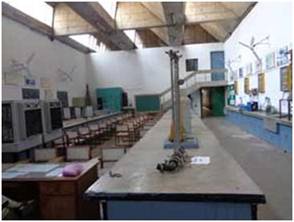 |
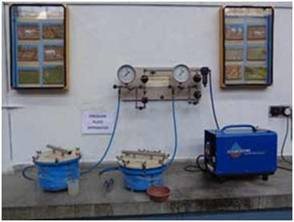 |
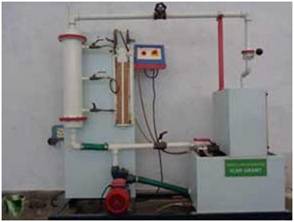 |
| Irrigation and Drainage Lab | Pressure Plate Apparatus | Darcy Law Apparatus |
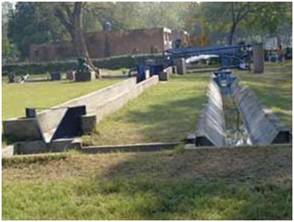 |
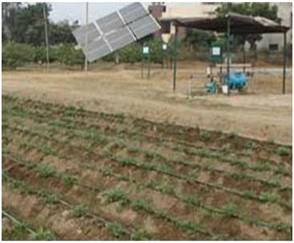 |
 |
| Field Laboratory | Research Farm | Naturally Ventilated Polyhouse |
College of Agricultural Engineering & Technology / Soil & Water Engineering / PG Students
|
List of M. Tech SWE students admitted during the year 2022-23 |
||||||
|
Sr. No. |
Name |
Admission No. |
Advisor’s Name |
Research title |
||
|
1 |
Lakshay Kumar |
L-2022-AE-170-M |
Dr. NileshBiwalkar |
Machine learning based site suitability for Litchi in Punjab |
||
|
2 |
Parneet Kaur |
L-2022-AE-171-M |
Dr. Rajan Aggarwal |
Assessment of solar energy potential for irrigation in central Punjab |
||
|
3 |
Sukhmandeep Kaur Brar |
L-2022-AE-172-M |
Dr. ArunKaushal |
Estimation of crop coefficients for rice-wheat cropping system using smart lysimeters |
||
|
List of M. Tech. (Soil & Water Conservation Engineering) Students admitted during the year 2023-24 |
||||||
|
Sr. No. |
Name of student |
Admission No. |
Name of Major Advisor |
Research Title |
||
|
1 |
Subhrajyoti Bhattacharjee |
L-2023-AE-320-M |
Dr. Nilesh Biwalkar |
|||
|
2 |
Divtesh Singh Aulakh |
L-2023-AE-174-M |
Dr. Mahesh Chand Singh |
|||
|
3 |
Preeti |
L-2023-AE-319-M |
Dr. Arun Kaushal |
|||
|
4 |
Narender Pal |
L-2023-AE-318-M |
Dr. Abrar Yousuf |
|||
|
5 |
Amrinder singh |
L-2023-AE-173-M |
Dr. Sunil Garg |
|||
|
List of M. Tech. (Irrigation & Drainage) Students admitted during the year 2023-24 |
||||||
|
Sr. No. |
Name of student |
Admission No. |
Name of Major Advisor |
Research Title |
||
|
1 |
Jyoti Padhan |
L-2023-AE-317-M |
Dr. Samanpreet Kaur |
|||
|
List of M. Tech. RS&GIS students admitted during the year 2021-22 |
||||||
|
1. |
Gurgopal Singh |
L-2021-AE-241-M |
Dr. Sanjay Satpute |
Study on Diurnal and Seasonal Carbon Dioxide Fluxes in Basmati rice |
||
|
2. |
Jaskaran Singh Sohal |
L-2021-AE-243-M |
Dr. Arun Kaushal |
Land use and land cover change analysis in district Shaheed Bhagat Singh Nagar of Punjab using Geospatial Technology |
||
|
3. |
Jaswinder Singh |
L-2021-AE-244-M |
Dr. Mahesh Chand Singh |
Role of Geospatial technology in the management of water resources |
||
|
4. |
Rasnoorpreet Singh Sidhu |
L-2021-AE-245-M |
Dr. Samanpreet Kaur |
Comparison of evapotranspiration estimation different approaches in basmati rice |
||
|
5. |
Visal Baby T. |
L-2021-AE-246-M |
Dr. Nilesh Biwalkar |
Spatio-temporal analysis of urban growth and its impact on Kole wetlands of Thrissur district |
||
|
List of M. Tech. RS&GIS students admitted during the year 2022-23 |
||||||
|
Sr. No. |
Name |
Admission No. |
Major Advisor Name |
Research Title |
||
|
1 |
Twinkle Devi |
L-2022-AE-185-M |
Dr. Rajan Aggarwal |
- |
||
|
2 |
Palkeen Kaur |
L-2022-AE-182-M |
Dr. Sudhir Thaman |
Artificial Intelligence Based Algorithm for Assessment of Crop Water Stress in Maize (Zea mays L.) Using Image Processing Techniques |
||
|
3 |
Kshitij Kumar |
L-2022-AE-179-M |
Dr. J P Singh |
- |
||
|
4 |
Sanskritii Sundar |
L-2022-AE-183-M |
Dr. Samanpreet Kaur |
- |
||
|
5 |
Harkanwaljot Singh |
L-2022-AE-176-M |
Dr. Dnyaneshwar Arjun Madane |
- |
||
|
6 |
Jashanpreet Singh Bhullar |
L-2022-AE-177-M |
Dr. Mahesh Chand Singh |
Artificial Groundwater Recharge Zoning in Hoshiarpur District of Punjab Using Geospatial Techniques |
||
|
7 |
Narain Singh |
L-2022-AE-181-M |
Dr. Nilesh Biwalkar |
Mapping transboundary dynamics of groundwater quality in border areas of punjab and haryana |
||
|
8 |
Aniket Kishor Chauhan |
L-2022-AE-173-M |
Dr. Chetna Singla |
Menace of Water Hyacinth in Kanjli Wetland of Punjab |
||
|
9 |
Daya Singh |
L-2022-AE-175-M |
Dr. Sanjay Satpute |
- |
||
|
10 |
Lovejeet Singh |
L-2022-AE-180-M |
Dr. Parveen Dahiphale |
- |
||
|
11 |
Karandeep Singh Punia |
L-2022-AE-178-M |
Dr. Arun Kaushal |
- |
||
|
12 |
Surinderpal Singh |
L-2022-AE-184-M |
Dr. J P Singh |
- |
||
|
13 |
Chandanjot Singh |
L-2022-AE-174-M |
Dr. Rajan Aggarwal |
- |
||
|
List of M. Tech. RS&GIS students admitted during the year 2023-24 |
||||||
|
1 |
Aniket Kumar |
L-2023-AE-175-M |
Dr. Chetan Singla |
|
||
|
2 |
Arundeep Singh |
L-2023-AE-176-M |
Dr. J. P. Singh |
|
||
|
3 |
Gurmanpreet Singh |
L-2023-AE-177-M |
Dr. Rajan Aggarwal |
|
||
|
4 |
Gurpinderjit Singh |
L-2023-AE-178-M |
Dr. Amina Raheja |
|
||
|
5 |
Harnoor Randhawa |
L-2023-AE-180-M |
Dr. Nilesh Bilwalkar |
|
||
|
6 |
Harshbab Singh |
L-2023-AE-181-M |
Dr. Arun Kaushal |
|
||
|
7 |
Harshdeep Singh |
L-2023-AE-182-M |
Dr. Mahesh Chand Singh |
|
||
|
8 |
Jaanamjeet Singh Dhillon |
L-2023-AE-183-M |
Dr. Parvin Dahiphale |
|
||
|
9 |
Nishu |
L-2023-AE-186-M |
Dr. Sudhir Thaman |
|
||
|
10 |
Simerjeet Singh |
L-2023-AE-187-M |
Dr. Samanpreet Kaur |
|
||
|
List of Ph. D (SWE) Student admitted during the year 2020-21 |
||||||
|
1 |
Ayushi Jha |
L-2020-AE-177-D |
Dr. Sunil Garg |
Artificial neural network model for adsorption based waste water treatment system for microirrigation |
||
|
List of Ph. D (SWE) Student admitted during the year 2021-22 |
||||||
|
1 |
Isha Swati |
L-2021-AE-165-D |
Dr. Samanpreet Kaur |
Optimizing surface water availability and cropping pattern in canal distributaries using an artificial intelligence approach |
||
|
List of PhD (Soil & Water Conservation Engineering) Students admitted during the year 2023-24 |
||||||
|
Sr. No. |
Name of student |
Admission No. |
Name of Major Advisor |
Research Title |
||
|
1 |
Manisha Kumari |
L-2023-AE-117-D |
Dr Mahesh Chand Singh |
|||
|
2 |
Nand Lal Kushwaha |
L-2023-AE-118-D |
Dr Nilesh Biwalkar |
|||
|
List of PhD (Irrigation & Drainage) Student admitted during the year 2023-24 |
||||||
|
Sr. No. |
Name of student |
Admission No. |
Name of Major Advisor |
Research Title |
||
|
1 |
Gavit Dipak Subhash |
L-2023-AE-119-D |
Dr. Sanjay Satpute |
|||






